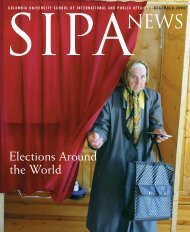Promoting IDPs' and Women's Voices in Post-Conflict Georgia
Promoting IDPs' and Women's Voices in Post-Conflict Georgia
Promoting IDPs' and Women's Voices in Post-Conflict Georgia
- No tags were found...
You also want an ePaper? Increase the reach of your titles
YUMPU automatically turns print PDFs into web optimized ePapers that Google loves.
Competition for Donor Fund<strong>in</strong>gAs the <strong>Georgia</strong>n government provides m<strong>in</strong>imal f<strong>in</strong>ancial support to NGOs, many are overly dependenton <strong>in</strong>ternational donors, result<strong>in</strong>g <strong>in</strong> fierce competition for these limited funds. Accord<strong>in</strong>g to one donorrepresentative, this has led to women’s <strong>and</strong> IDP organizations work<strong>in</strong>g aga<strong>in</strong>st each other, rather thanstrengthen<strong>in</strong>g collaboration to build up mutual capacities. 374 Some argue that NGOs have the necessarycapacity to coord<strong>in</strong>ate their efforts, but they lack the will<strong>in</strong>gness to do so <strong>and</strong> cont<strong>in</strong>ue to compete witheach other for fund<strong>in</strong>g. 375A representative from the Institute for Policy Studies adds that there are <strong>in</strong> fact two NGO communities<strong>in</strong> <strong>Georgia</strong>: “One is small but strong because all money goes to them. The other one is bigger butwithout voice.” 376 The first group has the support of the government because it rema<strong>in</strong>s connected togovernment officials who had participated <strong>in</strong> civil society prior to the Rose Revolution. This createsimplications for the impartiality of the work that these NGOs undertake, as they have it <strong>in</strong> their best<strong>in</strong>terest to avoid criticiz<strong>in</strong>g the government to ma<strong>in</strong>ta<strong>in</strong> favorable relations. 377Stakeholders from the local NGO community also highlight the challenges they face due to unstablefund<strong>in</strong>g. They po<strong>in</strong>t to the lack of susta<strong>in</strong>ability of their programs as a result of fund<strong>in</strong>g that is limited toone year, <strong>and</strong> urge <strong>in</strong>ternational <strong>and</strong> local donors to support their work on a more long-term basis. 378This would also help address the challenge NGOs face <strong>in</strong> gather<strong>in</strong>g <strong>and</strong> provid<strong>in</strong>g quality <strong>in</strong>formation totheir beneficiaries. 379 This will require work<strong>in</strong>g closely with the MRA <strong>and</strong> other relevant M<strong>in</strong>istries whodepend on NGOs to gather <strong>in</strong>formation on IDP communities.Leadership <strong>in</strong> the NGO CommunityAlthough the IDP NGO community <strong>in</strong> <strong>Georgia</strong> is responsible for many valuable <strong>in</strong>itiatives to promote IDP<strong>and</strong> women’s political participation, these organizations lack effective leadership at both theorganizational <strong>and</strong> network levels. That is, many NGOs are characterized by an <strong>in</strong>sular focus onbeneficiaries’ concerns at the expense of connect<strong>in</strong>g on collective issues. This results <strong>in</strong> a low level ofcollaboration among IDP NGOs, <strong>and</strong> thus a weaker collective voice to <strong>in</strong>fluence high-level policymak<strong>in</strong>g.Accord<strong>in</strong>g to one <strong>in</strong>terviewee, there is currently no clear IDP leader or lead<strong>in</strong>g organization to facilitatecommunication between IDP NGOs <strong>and</strong> other actors, or to take responsibility for represent<strong>in</strong>g IDPneeds. 380 This lack of leadership manifests itself <strong>in</strong>to a weak lobby<strong>in</strong>g capacity <strong>and</strong> perception of<strong>in</strong>competence. For <strong>in</strong>stance, a representative from the EU urged the Synergy Network to develop astrong lobby message <strong>and</strong> communicate it to the Steer<strong>in</strong>g Committee by request<strong>in</strong>g meet<strong>in</strong>gs with its<strong>in</strong>ternational members. She noted that the ability to lobby effectively reflects a group’s level of374 Tamuna Karosanidze (Deputy Chief of Party, G-PAC/East West Management Institute), Personal Interview, 30 January 2012.375 Eka Gvalia, Personal Interview.376 Nana Sumbadze, Personal Interview.377 Ibid.378 Eka Gvalia, Personal Interview.379 Senior Fellow, Personal Interview.380 Eka Gvalia, Personal Interview.72

















